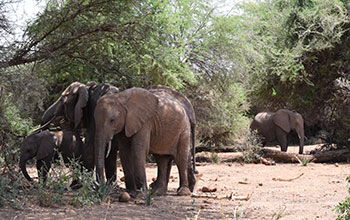Multimedia Gallery
Poaching alters orphan elephant's social lives (Image 1)
An elephant family rests during the midday heat in Samburu National Reserve, Kenya. Research shows that orphan elephants have less access to mature, dominant individuals than non-orphaned elephants. [See related image Here.]
More about this image
It is well known that elephants are very social animals that live in social structures with a level of complexity that rivals that of human societies. With that in mind, researchers questioned what impact poaching, which targets older individuals, may have on orphan animals’ social functioning.
A recent study led by researchers from Colorado State University (CSU) analyzed the social interaction patterns of juvenile female elephants and found that orphans have less access to mature, dominant individuals than non-orphaned elephants, whose primary social partners are their mothers and aunts.
The researchers found that social integration with the remaining adults in the population only compensates for the orphans loss of their mothers to some degree, at least during the initial years following their loss.
"Previous work in this and other elephant populations has shown that like other social species, elephants strengthen existing bonds if they lose important social partners," said Shifra Goldenberg, author of the published study and a postdoctoral researcher in CSU's Department of Fish, Wildlife, and Conservation Biology and with Save the Elephants, a nonprofit conservation organization in Kenya. "Our study suggests that despite this compensatory social behavior, orphans experience a social disadvantage compared to non-orphans."
"Access to older, dominant individuals is critical for juveniles, as mature individuals are knowledge repositories and have preferential access to resources," said co-author of the study George Wittemyer, an associate professor at CSU and chairman of the scientific board of Save the Elephants. "Losing this access may have long-term ramifications for orphans."
The study was conducted in the Samburu and Buffalo Springs national reserves in northern Kenya, the site of Save the Elephants' long-term elephant monitoring project. Over the last decade, the population has experienced increased ivory poaching and a severe drought, which left many young elephants without mothers and grandmothers.
This research was funded in part by a National Science Foundation Graduate Research Fellowship (grant DGE 13-21845).
Read more in the CSU news story Orphaned elephants' social lives substantially altered by poaching. Or read more about Shifra's elephant research on her website. (Date image taken: 2017; date originally posted to NSF Multimedia Gallery: June 28, 2018)
Credit: Shifra Goldenberg, Save the Elephants/Colorado State University
See other images like this on your iPhone or iPad download NSF Science Zone on the Apple App Store.
Images and other media in the National Science Foundation Multimedia Gallery are available for use in print and electronic material by NSF employees, members of the media, university staff, teachers and the general public. All media in the gallery are intended for personal, educational and nonprofit/non-commercial use only.
Images credited to the National Science Foundation, a federal agency, are in the public domain. The images were created by employees of the United States Government as part of their official duties or prepared by contractors as "works for hire" for NSF. You may freely use NSF-credited images and, at your discretion, credit NSF with a "Courtesy: National Science Foundation" notation.
Additional information about general usage can be found in Conditions.
Also Available:
Download the high-resolution JPG version of the image. (18.2 MB)
Use your mouse to right-click (Mac users may need to Ctrl-click) the link above and choose the option that will save the file or target to your computer.



